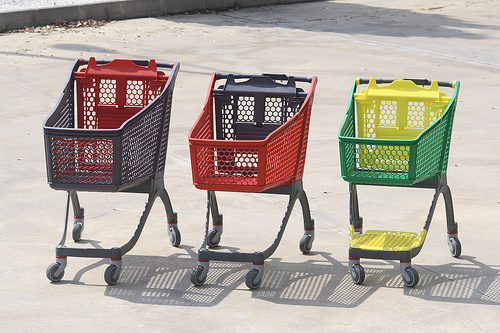Meal planning saves time and money

I admit, I was once very reluctant to meal plan. It seemed like a lot of work and, quite frankly, unnecessary. I mean, come on, you just have to throw a meal together. Instead of deciding what you want to cook that day, though, it's planned out in advance. There's no spontaneity in that. What's the point? Can it really save you time and money to plan it out? It turns out that it saves time and money, two things most of us are short on. It also improves nutrition because you're apt to make healthier food choices and eat less fried and processed foods.
Fewer trips to the grocery store reduce impulsive spending.
I've mentioned it before, but for a family, it often makes sense to make fewer trips to the grocery store. Some mentioned in the comments of that article that it made sense for them to go more frequently (singles, people who pop in on their way home from work to pick up the ingredients for dinner). I can see how that would work for some. For us, though, the more trips we make to the grocery store, the more opportunity there is for impulse buying. You know how it happens…you go in for one or two things and end up spending $20 or more. That can really add up over several trips to the store. Meal planning helps us by establishing a clear-cut list of what we need. We know that anything else we buy is just wasteful spending. By shopping once a week or every two weeks for groceries with a mid-week pickup for fresh fruits, veggies and milk can cut out that nasty habit.

No more wasted leftovers.
Leftovers used go to waste in our refrigerator. Dishes would get pushed to the back, forgotten about for weeks at a time. When it came time to clean out the refrigerator, I'd scold myself for all of that perfectly good food (and money) going to waste. With meal planning, you know how much of something you're going to make. If you're making a large pot of spaghetti for dinner one night, for example, you may have enough left over for lunch for two days afterward. That would go in the lunch slots for those days, eliminating the need to buy more food for those meals.
Reduced urge to get take-out or go through the drive-thru.
Why do we go out to eat? Usually, it's because we have nothing planned. After a long day at work, who wants to go home and think up something for dinner only to realize that one or more ingredients are missing? I know I didn't. Meal planning means we know what's on the menu that day, and because grocery shopping lists are carefully planned, we have everything we need. It's much harder to make excuses for getting take-out when there's nothing preventing you from making a more nutritious meal at home.
Buy only the things that you need.
Speaking of that carefully planned grocery list, if you meal plan properly, you have every single item that you're going to need for all of your meals. Why? Because you also go through your cupboards and freezer at the same time to incorporate those foods into your meals. If you do all that before you go shopping, you know that there's no need to pick up something that's not on your list. You buy exactly what you need…no more and no less.
Incorporating meal planning into our lives has saved a considerable amount of money. It shaved nearly $200 a month off our food bill. Surprisingly, most of that money was from wasteful spending at the grocery store rather than eating out. Thanks to the Internet, it doesn't have to take you hours to meal plan for the week. I know I still don't have that kind of time. I just look up menu plans (Pinterest is a great place to look), go through the menu to substitute meals that just don't fit our style, and adjust everything accordingly. Many of the menu planners even come with a complete grocery list, cutting your time spent on this even more.
Do you plan your meals? If so, do you do it to save time and money or just to eat more nutritiously?
Seafood salad picture courtesy of Mo Riza via Flickr.
Grocery cart picture courtesy of Polycart via Flickr.
2 comments